|
Saturdee
Opry Links # 92: Lieder Edition
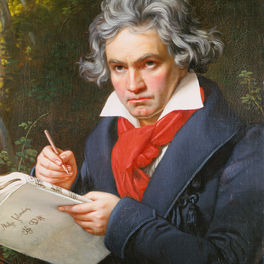 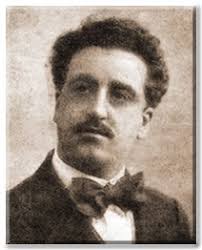 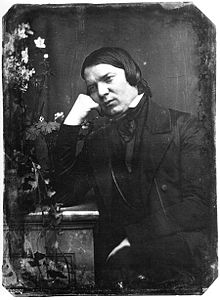
Beethoven
Ernesto de
Curtis Robert Schumann
Saturdee Opry Links Overture!
“Zaide,” by Mozart.
https://www.youtube.com/watch?v=N5tS_NS9t8I
1.
All Beethoven ever wanted in life was a good wife to care for him. As we
know, this never happened. Beethoven was condemned to solitude by his
unrefined nature, coarse manner, short stature, swarthy and pock-marked
face, and of course, his deafness. He was married to, if anything,
suffering---cursed with ill health for much of his life, and a nearly insane
obsession with his brothers' lives (ultimately a years-long, failed effort
to raise a deceased brother’s son---which likely cost the world more
symphonies, quartets, sonatas.) In his mid-20's, before serious deafness,
when he still had a semblance of optimism, Beethoven set a poem by Friedrich von Matthisson, "Adelaide," to music. The
text concerns a feminine ideal of the type Beethoven yearned for, and the
music he wrote clearly, poignantly expresses that yearning. Tenor Jussi
Bjorling sings it here, in a live performance at Carnegie Hall.
https://www.youtube.com/watch?v=1sc_F59q-0c
Translation;
https://en.wikipedia.org/wiki/Adelaide_(Beethoven)
2.
Most composers wrote songs, in addition to their other output (including
operatic.) Many German composers wrote lieder or "song cycles," sometimes
around a particular theme, sometimes just as a collection. Franz Schubert,
in his short life, wrote 600 songs! Here is one of the most loved, from his
"Rückert-Lieder" (songs using the poetry of Frederich Ruckert), "Du Bist die
Ruh," or "You are Peace." Here it is played and sung by soprano Sumi Jo. (Please
feel free to give Ms. Jo my phone number. Don't tell her I prefer
Fischer-Dieskau.)
https://www.youtube.com/watch?v=KPalXwnydAo
Translation:
https://www.oxfordlieder.co.uk/song/694
And as it is usually sung by a baritone, here it is with the great lieder
specialist, Dietrich Fischer-Dieskau:
https://www.youtube.com/watch?v=n81N6Nrm6Y4
3.
Friedrich Rückert was crazy-brilliant, a poet, scholar, linguist with
working understanding of dozens of languages. He introduced the western
world to much Arabic, Persian, Indian, and Chinese mythology and verse, and
inspired song-cycles by Schubert and (70 years later) Mahler. Here is a more
whimsical specimen of his poetry, "Lachen und Weinen," turned into a song by
Schubert. Excerpt: "In the evening I weep for sorrows / And why you can
awake / In the morning with laughter / I must ask you, o heart." Sing it
with me, now, "Muss Ich dich fragen o Herz!"
First, a baritone---again, the great Fischer-Dieskau, followed by soprano
Kathleen Battle.
Fischer-Dieskau:
https://www.youtube.com/watch?v=ZUB-AfeFXEY
Kathleen Battle: (transposed to a higher key.)
https://www.youtube.com/watch?v=69TC8V5wPC0
Translation:
https://en.wikipedia.org/wiki/Lachen_und_Weinen
About Rückert:
https://www.poemhunter.com/friedrich-r-ckert-2/biography/
4.
Mahler wrote a five-song cycle of poems by Friedrich Rückert, the
"Rückert-Lieder" during 1901-02. Here is the first of the profoundly
atmospheric, affecting five, the sublime love song, "Ich atmet' einen linden
Duft!" ("I breathed a gentle fragrance"), performed by the
superb late mezzo, Jessye Norman. Zubin Mehta conducts the NY Phil.
https://www.youtube.com/watch?v=l3jP3FnbAhY
Translation:
https://www.oxfordlieder.co.uk/song/1937

About Ms. Norman:
https://www.nytimes.com/2019/09/30/obituaries/jessye-norman-dead.html
5.
I know that Saturdee Opry Links excites you all greatly, so I hope you have
sedatives at hand in the event the thrill proves too overwhelming. .
.Puccini wrote free-standing songs well before he wrote operas---and also
while he wrote operas---and bits of some of those songs found their way into
his operas, none more noticeably than "Sole e amore" ("The sun and love." )
It's a trifle, lyrically, with an unknown author, but Puccini's setting of
it well exemplifies his great gift as a melodist. He wrote it in 1888, but
put it to much more effective use twelve years later as a duet in act three
of "La Boheme." Here it is, sung in concert by Jose Carreras, followed by
the point where it is used in "Boheme!"
https://www.youtube.com/watch?v=c7fcH2lyndo
Translation:
https://www.lieder.net/lieder/get_text.html?TextId=131649
Here is the "Boheme" appearance (go to 13:50) in which the melody is used
for Rodolfo and Mimi to vow to stay together until spriing.
https://www.youtube.com/watch?v=2KyOpIVJYII
6.
I'm so stupid. Here I thought that by showcasing songs---instead of arias,
and opera excerpts---this might be less intimidating to my esteemed friends,
and draw them in. Sooooo stoooopid. Why, you're even less interested! I
know, I know, you have more important things to do, like reading about Trump
and trimming your cat's anal fur. (My neighbor actually does this.) I
understand! I really do! But I will labor on in noble futility, hoping that
one among you takes a deep breath, steels yourself, and dares to actually
experience something new and different in life. So here is an easy one: the
chestnut Neapolitan song, "Mattinata," by Leoncavallo, sung rather nicely by
much-in-demand tenor Lawrence Brownlee. "The dawn, dressed in white, has
opened its door to the sun. . ."
https://www.youtube.com/watch?v=jw48wbgH4OE
Translation:
https://www.lieder.net/lieder/get_text.html?TextId=10075
Or, if you'd like the hear a version to make your hair stand on end. . .
https://www.youtube.com/watch?v=bIs8FEMhKrU
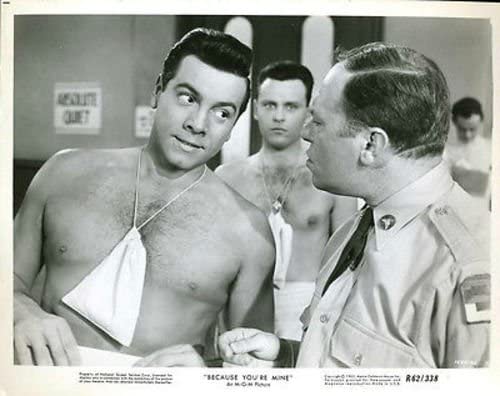
Mario
Lanza, pre-pasta
7.
Okay, kids, now here is a song and a half. This is "Till Havs" ("At Sea"),
which if it is not the Swedish national anthem, should be. This is a
stupendous performance by Jussi Bjorling, luckily caught on film in 1953. If
you have trouble relating because it is Swedish, just imagine he is singing
"Tutti Frutti." (If this doesn't stir your blood a little, or just plain
make you feel good, I'm deeply sorry for you.)
https://www.youtube.com/watch?v=FjGnanUrZjA
Swedish, for those who wish to sing along:
https://www.lieder.net/lieder/get_text.html?TextId=13421
Translation:
Now the sea's fresh wind is blowing from the southwest
And lovingly caresses the sailor's cheek from all the winds
best!
At sea, at storms, you bold hunting,
To storms, to sea, one was on guard,
At sea!
In an endless way, life is free, coercion does not
thrive,
When the sea sings, green and white, its high
freedom song
At sea, at storms, you bold hunting,
To storm, to sea, one was on guard,
At sea!
Swell wonderfully, beautiful sails, swell in the wind
dust,
Fly forward with joy towards the scales of the wave in the moment
highest desire!
At sea, at storms, you bold hunting,
To storms, to sea, one was on guard,
At sea!
8.
Robert Schumann was sufficiently unbothered by incipient insanity that he
was able to knock out the marvelous little song cycle, "Dichterliebe"
("Poet's Love"), which is a sort of compendium of whimsicality, ardor,
reflection, even touches of joy. Oh, and also. . ."fuck you!" Or, as Monty
Python put it, "I fart in your general direction." Yes! Sentiments near and
dear to our hearts, whether we admit it or not. For those of you who prefer
less crass imagery, let's call it "nose-thumbing in song." This is the
sharp, almost perfunctory ditty, "Ich Grolle Nicht," or "I Grieve Not." It
must be sung emphatically, unambiguously. Let's say it's about a
broken-hearted lover whose feelings are mended once he has a little more
perspective on his one-time beloved. Sample lyric: "The dismal shadows in
your gloomy spirit / I saw the serpent that devours your core / And oh, my
darling how forlorn you are ... I hold no grudge!" In other words, to quote
poor George Sanders's suicide note, "I leave you to your cesspool." Here is
this great song, a setting of a poem by Heinrich Heine, which deserves
better than the due I have tried to give it.
Here is Dietrich Fischer-Dieskau, live on stage in 1956. And he's pissed!
https://www.youtube.com/watch?v=c5W3qGUa9XU
Translation:
https://www.lieder.net/lieder/get_text.html?TextId=36862
About "Dichterliebe:"
https://en.wikipedia.org/wiki/Dichterliebe
Annnnnnd, just for fun!
https://www.youtube.com/watch?v=f7BqvlFR_hc
9.
You might say this standard is the flip-side, at least
emotionally, of "Ich Grolle Nicht" (previous post.) This is the "hit song,"
"Non Ti Scordar di Me," or "Do Not Forget Me!"---one of the beloved
Neapolitan songs by Ernesto de Curtis. Here it is sung quite beautifully,
without hamming it up, by one of the world's current leading tenors, Juan
Diego Florez.
Translation:
Do not forget me:
my life tied up and you.
I love you more and more,
in my dream you stay.
Do not forget me. . .
https://www.youtube.com/watch?v=cilWkBsxhw8
Full translation: (scroll down)
https://www.translatelyrics.net/en/luciano-pavarotti/non-ti-scordar-di-me/23012/
OR, if you prefer to be electrified by someone pulling
out all the stops. . .
https://www.youtube.com/watch?v=k7QghqDdzSs
FINAL BOW:
Our song survey today has covered Beethoven, Schubert, Schumann, Neapolitan
classics, a Swedish anthem, rare Puccini, even Gustav Mahler. It should give
a hint as to the massive number of free-standing songs written by composers
over the centuries. We'll close with one from the baroque era that
transcends that categorization, standing as one of the most affecting ever
composed---and all too poignant in our sad time. Yes, it is from an opera,
"Xerxes," by Handel, but has been part of concert song
repertory for a couple hundred years, so I guess it's okay to include. In
tribute to the thousands of trees dying in California fires, and all of
nature in this paradise now compromised and threatened with extinction by
human beings, here is Joyce Di Donato and members of the Metropolitan Opera
Orchestra.
https://www.youtube.com/watch?v=74PyAy-CO8Q
Translation:
Tender and beautiful fronds
of my beloved plane tree,
let Fate smile upon you.
May thunder, lightning, and storms
never disturb your dear peace,
nor may you by blowing winds be profaned.
Never was a shade
of any plant
dearer and more lovely,
or more sweet.
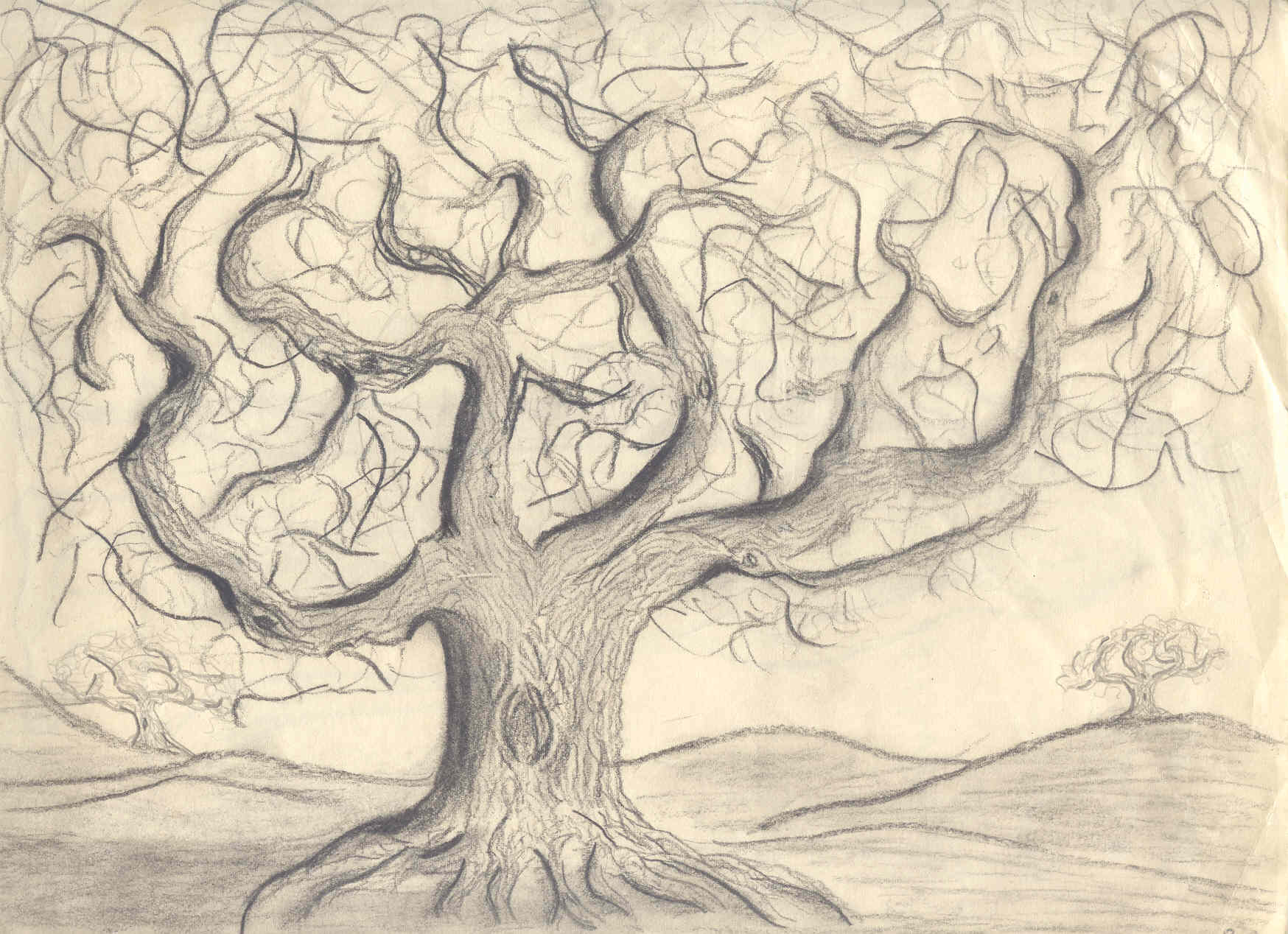
“Oak Tree,” by RR, age
fifteen, homesick for Thousand Oaks.
Back to Opera Links
Back to Home Page
|



